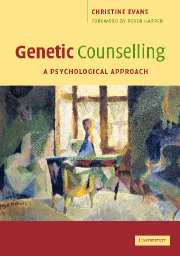Book contents
- Frontmatter
- Contents
- Acknowledgements
- Foreword
- Preface
- 1 An overview of genetic counselling
- 2 The psychological processes underlying genetic counselling
- 3 Understanding individual difference in genetic counselling using attachment theory
- 4 The role and skills of the counsellor and ideas from psychotherapy
- 5 Examples of the role and skills of the counsellor
- 6 The gene and the family system
- 7 Working with parents and children
- 8 The influence of the nature of the disorder on the consultation
- 9 The effect on the counsellor
- 10 The interview and non-directiveness
- References
- Index
2 - The psychological processes underlying genetic counselling
Published online by Cambridge University Press: 12 August 2009
- Frontmatter
- Contents
- Acknowledgements
- Foreword
- Preface
- 1 An overview of genetic counselling
- 2 The psychological processes underlying genetic counselling
- 3 Understanding individual difference in genetic counselling using attachment theory
- 4 The role and skills of the counsellor and ideas from psychotherapy
- 5 Examples of the role and skills of the counsellor
- 6 The gene and the family system
- 7 Working with parents and children
- 8 The influence of the nature of the disorder on the consultation
- 9 The effect on the counsellor
- 10 The interview and non-directiveness
- References
- Index
Summary
The previous chapter clarified that although every genetic counselling consultation is unique, there is, nevertheless, a definite and general form to a consultation. This has evolved from clinical experience and is designed to help the individual address the issues involved. This thoughtful and measured approach applies to a single consultation, as much as it does to a series in predictive testing. The pace of genetic counselling protects the individual from rushing into testing recognising that there are implications to having personal genetic knowledge. This chapter explains how genetic counselling is a psychological challenge, which emanates from the interaction between the nature of genetics and the individual. There is a challenge which is innate in addressing genetic issues, but the individual perception is a key factor in determining whether the challenge is experienced as a stress. This in turn governs how the individual approaches and responds to genetic counselling.
Uncertainty and the effects of knowledge
Uncertainty is part of every day life experience, a normal anxiety about what might happen in the future. This is always the unknown territory of the imagination onto which the individual projects long-standing personal ideas and attitudes. When there is a genetically determined illness in a family, this existential anxiety may become exacerbated and the fear then becomes focused on the unpredictable genetic element of the illness. Some people will project their good luck and certainty that they are free from the genetic change, or that they will not be affected by illness.
- Type
- Chapter
- Information
- Genetic CounsellingA Psychological Approach, pp. 17 - 44Publisher: Cambridge University PressPrint publication year: 2006
- 1
- Cited by

